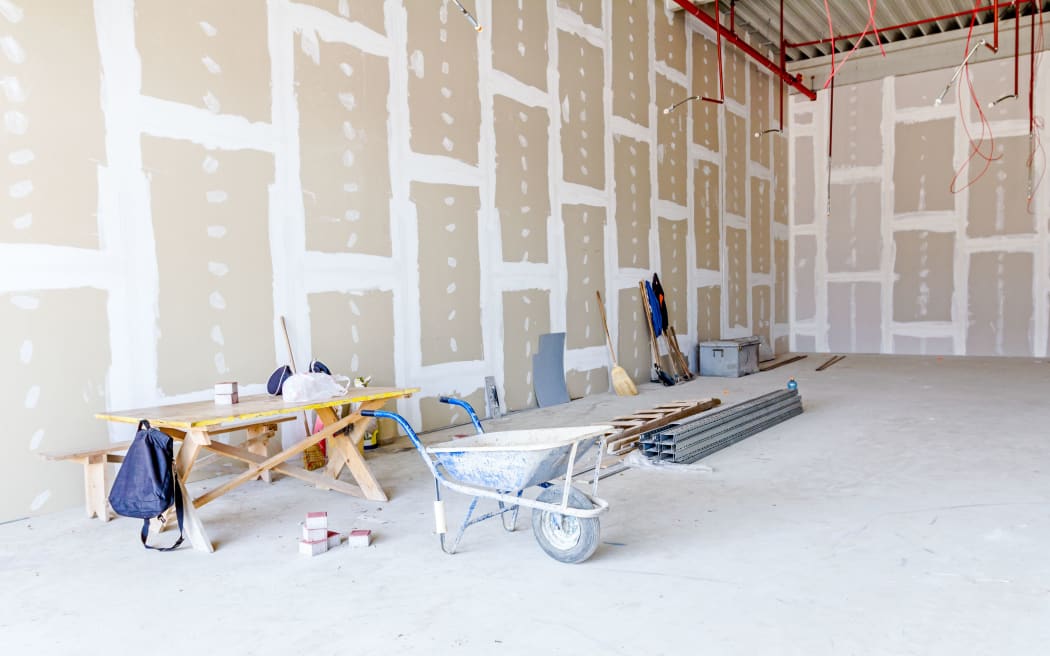Gib shortage: Task force will lead to better supply, member says
A member of the ministry’s plasterboard shortages task force is confident this will lead to the availability of a wider range of imported products.
Photo: 123RF
Fletcher Building’s Gib holds around 95% of the market, but demand has outstripped supply, leaving some housing projects unfinished and some builders struggling to stay afloat.
The task force announced on Tuesday will examine whether regulation of alternative plasterboard products is needed, ways to streamline the use of untested products in the market, new distribution models, advice on consent approaches and take action. as a forum for supply chain issues.
Fletcher Building expects the wallboard market to return to equilibrium by October, the company said in documents Wednesday, ahead of its investor day.
Supply would increase by 10% over the next four months, after reconfiguring its factory, increasing imports and issuing royalty-free licenses to 10 parties to import foreign-made plasterboard, which could violate its mark. Fletcher Building’s new plasterboard factory near Tauranga is due to open next year.
Traders would also run an emergency allowance fund to help small customers in the meantime, he said.
Task force member Naylor Love’s managing director Rick Herd said there had to be competition in the market.
“My personal program would be to see the construction industry informed of the alternatives to Gib products available for import and those available through agencies already established…and what is the equivalence of these products to Gib products “Herd said. .
It was possible to get alternatives to New Zealand on a reasonable scale, he said. The standard equivalent of Gib could be imported cheaply, although specialist plasterboard is generally more expensive than local product, he said. morning report.
Naylor Love and other large organizations imported their own plasterboard, but those doing small projects—particularly home builders—did not have the ability or the resources to import products from overseas.
Herd thought the task force would lead to improved supply.
“In another 12 months we will find that there is a much wider range of imported products available in New Zealand – and tested, high quality products.
“I am confident that with the support of the Government, the Construction Agreement, we can let industry know what is available and also start testing other products that become available.
“The Gib suite of products is a great product that has served New Zealand well. There’s a very good reason why it’s 95% of the market, because it’s a good product. But we have to, exactly this view of shortages, and price gouging, we need alternative competition in the marketplace.”
If Fletchers had imported alternative products to supplement his own, as he had heard they had, it was the right thing to do. “If they have a 95% market share, they have an obligation to the market to maintain continuity of supply.”
The task force also includes Dave Kelly, chief executive of the Registered Master Builders Association of New Zealand, Shane Brealey, chief executive of Simplicity Living, Sir Stephen Tindall, founder of The Warehouse and chairman of the Tindall Foundation, a representative from LGNZ and 2degrees founder, Tex Edwards.
Fletcher Building said Tuesday it would welcome constructive suggestions to resolve current supply issues.
He said he has already granted non-exclusive, royalty-free licenses to 10 parties to import foreign-made plasterboard, which may infringe Fletchers’ trademarks.
The company had confirmed to Building and Construction Minister Megan Woods that it would “grant similar licenses on similar terms to other parties until May 2023, after which time our new Tauranga plant will be operational and will do more than meet current demand requirements,” he said. .
Even though demand plummeted and production increased when the Tauranga plant came online, there was still to be a long-term change, Herd said.


Comments are closed.